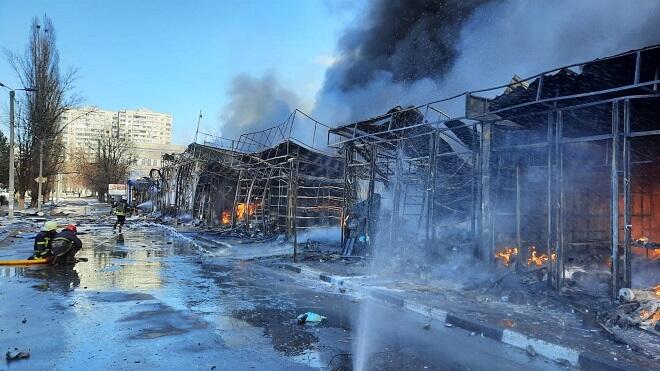I received some alternative viewpoints after my last blog post. In that post (Are You Traumatized?), I described the position that you ought to be defined as traumatized only if you suffered some impairment following life-threatening events. In other words, experiencing a life-threatening event by itself does not equal traumatized.
Axar.az reports citing Psychology Today.
One respondent, for example, chastised me for making non-impaired trauma survivors feel invalidated. Another respondent felt affronted because she had been through a horrible experience and felt like she had been traumatized even though she had no lasting impairment from it. By the logic of these viewpoints, nearly 100% of the adult population is traumatized.
I understand the point of view of those folks, and I think the disagreement illustrates an incredibly important issue for the trauma field. Those folks want to be able to claim the distinction of being traumatized. But clinicians and researchers, as experts in a field, have a higher level of responsibility to use the terms more precisely.
There are two different issues – the definition of traumatized versus not traumatized, and the definition of stress versus trauma. The lessons underlying both are similar so I will focus on only stress versus trauma for conciseness.
When the term trauma is used loosely in the professional sphere, it can be because folks have different motivations. Here’s a good example. I was in a meeting recently with leaders of an agency and we were discussing the results of the universal screening for trauma and trauma-related problems that I helped them to implement. The agency deals with children in foster care. When children are placed in foster care, they are usually being removed from their biological parents. In our screen, being removed from biological parents to a foster placement is not counted as a life-threatening trauma. The director of the agency vigorously questioned why we’re not capturing that removal process as a traumatic event.
I reminded the director that the trauma screen was designed to screen for PTSD, and the evidence is consistent that the type of stress involved in the removal process does not lead to the development of PTSD. Everyone already knew that. Stress and trauma are different, and the director wasn’t really arguing about that. But the director was definitely arguing about something, so I asked to back up a minute and ask why would you even want to create the message that children are being put through trauma when your agency removes them into foster care?
The director responded that they have to make the case to donors that the agency needs more funding for in-home services to keep families together. The story that separation is trauma (and not just stress) could motivate donors to open their pocketbooks. The motivation, thus, was political.
The politics of trauma appear commonly. PTSD has become so well-accepted as the obvious psychological problem following traumatic experiences that hitching your horse to the PTSD wagon adds instant credibility. PTSD has become its own worst enemy because of its success.
Science journals are full of examples like this. Researchers were concerned about the sociocultural impact from the stress of the Exxon Valdez oil spill in Alaska in 1989, so they surveyed the inhabitants who lived around the area of the spill. None of the residents incurred injuries. The lives of these residents were never threatened. They were not in any physical danger from the spill. Instead they were stressed because their abilities to make a living were harmed because the oil spill damaged their fishing grounds. The researchers concluded that PTSD was present in 25% of the residents who had high exposure to the oil. A different group of researchers used the same strategy following the Deepwater Horizon oil spill in the Gulf of Mexico in 2010.
Researchers in England were concerned about the impact from the stress of divorce on children, so they surveyed adolescents and concluded that 34% of them qualified for divorce-related PTSD. In fact, PTSD supposedly followed at a higher rate from divorce than from truly life-threatening experiences!
Most of the individuals that those studies claimed to have PTSD did not have PTSD. Of that, I would be rather confident. Those studies are useless in my opinion. An analogy of the difference between what those individuals had in those studies from true PTSD is the difference between anxiety attacks and panic attacks. The symptoms of anxiety attacks and panic attacks overlap a lot. During anxiety attacks, individuals are distressed but they recover quickly as soon as they can leave the situation that caused their anxiety. In contrast, during panic attacks the symptoms are intense and debilitating; the intensity and quality of the symptoms are such that individuals feel like they are going to die. If you do not understand the difference, it probably means that you have never had a panic attack.
It appears then that the usage of the term trauma varies depending on at least three different user situations. The first situation is for all individuals who experience stress. If you think of yourself as trauma survivors, there seems to be an instinctual social value in that. If, as Oprah Winfrey likes to say, we should listen when people are trying to tell us who they are, then we should pay attention to what folks are saying about their feelings toward trauma. It appears that folks would rather be thought of as trauma survivors, as opposed to stress survivors. There must be some positive value to be able to think of oneself that way.
Science journals are full of examples like this. Researchers were concerned about the sociocultural impact from the stress of the Exxon Valdez oil spill in Alaska in 1989, so they surveyed the inhabitants who lived around the area of the spill. None of the residents incurred injuries. The lives of these residents were never threatened. They were not in any physical danger from the spill. Instead they were stressed because their abilities to make a living were harmed because the oil spill damaged their fishing grounds. The researchers concluded that PTSD was present in 25% of the residents who had high exposure to the oil. A different group of researchers used the same strategy following the Deepwater Horizon oil spill in the Gulf of Mexico in 2010.
Researchers in England were concerned about the impact from the stress of divorce on children, so they surveyed adolescents and concluded that 34% of them qualified for divorce-related PTSD. In fact, PTSD supposedly followed at a higher rate from divorce than from truly life-threatening experiences!
Most of the individuals that those studies claimed to have PTSD did not have PTSD. Of that, I would be rather confident. Those studies are useless in my opinion. An analogy of the difference between what those individuals had in those studies from true PTSD is the difference between anxiety attacks and panic attacks. The symptoms of anxiety attacks and panic attacks overlap a lot. During anxiety attacks, individuals are distressed but they recover quickly as soon as they can leave the situation that caused their anxiety. In contrast, during panic attacks the symptoms are intense and debilitating; the intensity and quality of the symptoms are such that individuals feel like they are going to die. If you do not understand the difference, it probably means that you have never had a panic attack.
It appears then that the usage of the term trauma varies depending on at least three different user situations. The first situation is for all individuals who experience stress. If you think of yourself as trauma survivors, there seems to be an instinctual social value in that. If, as Oprah Winfrey likes to say, we should listen when people are trying to tell us who they are, then we should pay attention to what folks are saying about their feelings toward trauma. It appears that folks would rather be thought of as trauma survivors, as opposed to stress survivors. There must be some positive value to be able to think of oneself that way.
The second situation is for researchers who study trauma. These researchers have the responsibility to conduct research properly and use the more narrow definition of trauma (i.e., truly life-threatening events) so that research results are accurate and reliable.
The third situation is for consumers of psychological literature. They ought to be aware that the term trauma has different meanings depending on the politics of the persons who are doing the writing, which we shall encounter again in future posts.
|
Date
2017.06.08 / 19:16
|
Author
Axar.az
|
|
See also

















.jpg)































